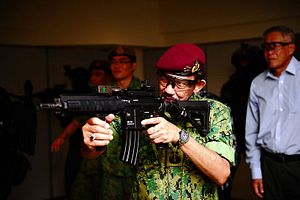Earlier this week, Brunei’s second defense minister laid out some of the policies and future initiatives of the defense ministry for the fiscal year, including a proposed defense budget increase. The budget allocation reflects an ongoing effort by the Southeast Asian state to increase its defense spending following previous drastic cuts amid wider economic challenges.
While there are strong elements of continuity within Brunei’s broader security thinking, in previous years, the country’s defense budget had come under growing strain due to broader economic challenges – rooted partly in the fact that the sultanate remains heavily dependent on the energy sector and declining energy prices had put pressure on government finances. While the strain has been relatively lessened over the past few years with some budget increases, all eyes were on the figures this year given the wider global geopolitical challenges at play that the Southeast Asian state has not been immune from.
This week, Brunei’s defense outlook was in the headlines with the introduction of the new defense budget. Brunei’s second defense minister presented the defense budget to the legislature as is customary following the opening of the 16th Legislative Council (LegCo) session this week on March 9.
Per the second defense minister, the budget for the defense ministry allocated for the financial year of 2020-2021 was designated at B$606,027,220 (US$432.15 million). This constitutes an increase of around 0.27 percent from the previous financial year. The second defense minister mentioned that the budget increase came in the context of a complex geopolitical environment, with a range of challenges explicitly mentioned including the South China Sea and the Novel Coronavirus-19 (COVID-19).
The proposed defense budget speaks to the challenge Brunei faces in having to both continue to invest in its defense capabilities to address security issues after earlier periods of major cuts as well as to manage immediate and significant economic challenges, with diversification efforts in the hydrocarbon-dependent country stymied and it having Southeast Asia’s highest unemployment rate at over nine percent. Seen from that perspective, it is worth noting that while Brunei did manage to avoid a defense budget cut this year, a 0.27 percent increase is quite minor relative to increases we saw in 2019 (6 percent) and 2018 (12.5 percent) after a period of more modest increases and some large double-digit cuts.
To be sure, this defense budget number should not detract from the fact that this is just one reference point with respect to Brunei’s defense capabilities, or that there is much continuity within its broader security thinking, as evidenced from the minister’s reinforcement of the three strategic defense pillars of deterrence and response; defense diplomacy; and holistic defense, tied to broader priorities inherent in the sultanate’s Wawasan 2035 vision. There was also an emphasis on initiatives being undertaken and future developments as well, be it the establishment of a defense cyber unit and advances in defense science and technology or the expected release of the country’s defense white paper, which is expected to be released when Brunei holds the ASEAN chair in 2021 and when the Royal Brunei Armed Forces has its 60th anniversary.
Nonetheless, amid these wider opportunities and challenges, data points such as budget numbers will be continued to be monitored in the coming months and years to get a sense of how Brunei is managing its defense challenges, as well as what the implications might be for continuity and change in its wider security outlook.

































